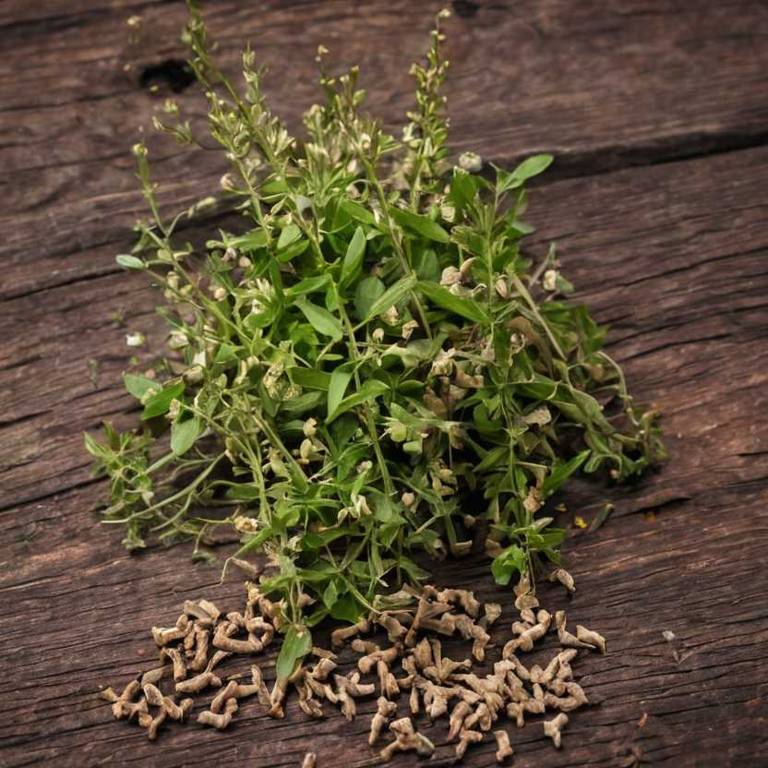Chinese Knotweed (Polygonum multiflorum)
Chinese Knotweed (Polygonum multiflorum) is a member of the Polygonaceae family, native to China, Korea, and Japan. Traditionally, its roots, rhizomes, and stems have been used for decoctions, infusions, and powders.
This herb is particularly valued for its tonic, anti-inflammatory, and astringent actions, and has a long history of use in traditional chinese medicine, japanese kampo medicine, and korean traditional medicine.

Quick Facts / Key Information
| Common Name | Chinese Knotweed |
|---|---|
| Scientific Name | Polygonum multiflorum |
| Plant Family | Polygonaceae |
| Genus | Polygonum |
| Species | multiflorum |
| Native Range | China, Korea, Japan |
| Plant Parts Used | Roots, Rhizomes, Stems |
| Primary Medicinal Actions | Tonic, Anti-Inflammatory, Astringent |
| Primary Traditional Systems | Traditional Chinese Medicine, Japanese Kampo Medicine, Korean Traditional Medicine |
| Historical Preparation Methods | Decoction, Infusion, Powder |
Botanical Identity
- Scientific Name
- Polygonum multiflorum
- Common Name
- Chinese Knotweed
- Synonyms / Alternative Names
- Polygonum Multiflorum, He Shou Wu, Japanese Knotweed
- Plant Family
- Polygonaceae
- Genus
- Polygonum
Botanical Description
- Growth Habit
- Perennial herbaceous plant.
- Height
- It typically reaches a height of 0.3 to 1.5 meters.
- Leaves
- Broad leaves with upper surface dark green and lower surface pale green, featuring prominent stomatal bands along the midrib.
- Flowers
- Flowers are arranged in dense clusters, exhibit actinomorphic symmetry, and have six tepals that are uniformly pink to reddish in color with no distinct markings
- Stems
- Climbing, with nodes bearing adventitious roots, stems are cylindrical, hollow, and have a smooth, glabrous surface with longitudinal ridges.
Traditional Uses / Historical Use
Traditional Systems
- Traditional Chinese Medicine
- Japanese Kampo Medicine
- Korean Traditional Medicine
- Ayurvedic Medicine
Historical Preparation Methods
- Decoction
- Infusion
- Powder
- Tincture
Medicinal Actions
- Tonic
- In herbal literature, noted as a calming tonic, in whole-system applications.
- Anti-inflammatory
- Traditionally described as a gentle anti-inflammatory, in tissue-soothing contexts.
- Astringent
- As described in traditional systems, a soothing astringent, in tissue-toning contexts.
- Diuretic
- In herbal texts, considered a warming diuretic, for moisture-related balance.
Active Compounds
- Flavonoid
- A chemical class commonly identified in plant tissues, especially flowers and leaves.
- Tannin
- A class of polyphenolic compounds commonly found in bark, leaves, and seeds.
- Phenolic Acid
- Organic acids commonly occurring as part of plant secondary metabolism.
- Glycoside
- A broad class of compounds composed of a sugar bound to a non-sugar component.
Modern Research Overview
This section is reserved for future summaries of scientific research related to this plant. As additional verified sources are reviewed, relevant study information will be added here.
Safety & Contraindications
- General Precautions
- The use of this herb may warrant general caution in certain situations.
- Contraindications
- Contraindications for this herb are not clearly established in available sources.
- Allergies
- There is insufficient evidence to determine whether this herb commonly causes allergic reactions.
- Drug Interactions
- Interactions between this herb and prescription medications are not clearly established.
- Toxicity
- Toxicity related to this herb has been documented in available sources.
- Pregnancy & Breastfeeding
- Use during pregnancy or breastfeeding has not been clearly established in available sources.
Preparation & Usage Methods
- Infusion
- A preparation method involving steeping plant material in heated water for a short period.
- Decoction
- A preparation method involving prolonged boiling of roots, bark, or dense plant material.
- Poultice
- Poultices involve external application of prepared plant matter.
- Powder
- This method converts dried plant material into a uniform powder.
- Tincture
- A preparation involving soaking plant parts in alcohol for extended extraction.
Growing, Harvesting & Storage
Growing / Cultivation
- Soil
- Prefers loamy soil with well-drained conditions. Typically grows best in organically rich soils.
- Sunlight
- Thrives in partial shade. Tolerates full sun to partial shade.
- Watering
- Prefers moist soils. Tolerates variable moisture levels.
Medical Disclaimer
The information provided on this page is for educational and informational purposes only. It is not intended to diagnose, treat, cure, or prevent any medical condition. Always consult a qualified healthcare professional before using any herb for medicinal purposes.